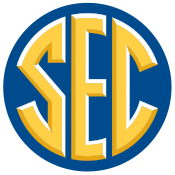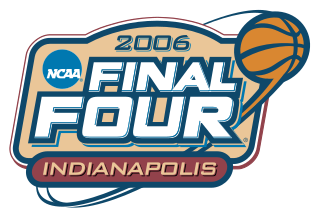
The 2006 NCAA Division I men's basketball tournament involved 65 teams playing in a single-elimination tournament to determine the national champion of men's NCAA Division I college basketball as a culmination of the 2005–06 basketball season. It began on March 14, 2006, and concluded with the championship game on April 3 at the RCA Dome in Indianapolis, Indiana.

The 1985 NCAA Division I men's basketball tournament involved 64 schools playing in single-elimination play to determine the national champion of men's NCAA Division I college basketball. This was the first year the field was expanded to 64 teams, from 53 in the previous year's tournament. It began on March 14, 1985, and ended with the championship game on April 1 in Lexington, Kentucky. A total of 63 games were played.

The 1987 NCAA Division I men's basketball tournament involved 64 schools playing in single-elimination play to determine the national champion of men's NCAA Division I college basketball. It began on March 12, 1987, and ended with the championship game on March 30 in New Orleans, Louisiana. A total of 63 games were played.

The 1988 NCAA Division I men's basketball tournament involved 64 schools playing in single-elimination play to determine the national champion of men's NCAA Division I college basketball. The 50th annual edition of the tournament began on March 17, 1988, and ended with the championship game on April 4 returning to Kansas City for the 10th time. A total of 63 games were played.

The 1989 NCAA Division I men's basketball tournament involved 64 schools playing in single-elimination play to determine the national champion of men's NCAA Division I college basketball. It began on March 16, 1989, and ended with the championship game on April 3 in Seattle. A total of 63 games were played.
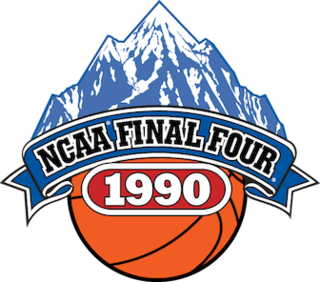
The 1990 NCAA Division I men's basketball tournament involved 64 schools playing in single-elimination play to determine the national champion of NCAA Division I men's college basketball. It began on March 15, 1990, and ended with the championship game on April 2 in Denver, Colorado. A total of 63 games were played.

The 1991 NCAA Division I men's basketball tournament involved 64 schools playing in single-elimination play to determine the national champion of men's NCAA Division I college basketball. It began on March 14, 1991, and ended with the championship game on April 1 in Indianapolis, Indiana. A total of 63 games were played.
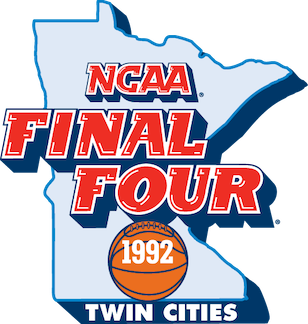
The 1992 NCAA Division I men's basketball tournament involved 64 schools playing in single-elimination play to determine the national champion of men's NCAA Division I college basketball. It began on March 19, 1992, and ended with the championship game on April 6 in Minneapolis. A total of 63 games were played.

The 1996 NCAA Division I men's basketball tournament involved 64 schools playing in single-elimination play to determine the national champion of men's NCAA Division I college basketball. It began on March 14, 1996, and ended with the championship game on April 1 at Continental Airlines Arena in the Meadowlands Sports Complex in East Rutherford, New Jersey. A total of 63 games were played.

The 1997 NCAA Division I men's basketball tournament involved 64 schools playing in single-elimination play to determine the national champion of men's NCAA Division I college basketball. It began on March 13, 1997, and ended with the championship game on March 31 in Indianapolis, Indiana at the RCA Dome. A total of 63 games were played.
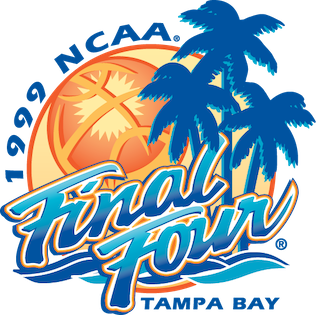
The 1999 NCAA Division I men's basketball tournament involved 64 schools playing in single-elimination play to determine the national champion of men's NCAA Division I college basketball. It began on March 11, 1999, and ended with the championship game on March 29 at Tropicana Field in St. Petersburg, Florida. A total of 63 games were played. This Final Four was the first—and so far, only—to be held in a baseball-specific facility, as Tropicana Field is home to the Tampa Bay Rays.

The 2002 NCAA Division I men's basketball tournament involved 65 schools playing in single-elimination play to determine the national champion of men's NCAA Division I college basketball. It began on March 12, 2002, and ended with the championship game on April 1 in Atlanta at the Georgia Dome. A total of 64 games were played.

The 2004 NCAA Division I men's basketball tournament involved 65 schools playing in single-elimination play to determine the national champion of men's NCAA Division I college basketball. It began on March 16, 2004, and ended with the championship game on April 5 at the Alamodome in San Antonio, Texas. A total of 64 games were played.

The 1998 NCAA Division I men's basketball tournament involved 64 schools playing in single-elimination play to determine the national champion of men's NCAA Division I college basketball. It began on March 12, 1998, and ended with the championship game on March 30, at the Alamodome in San Antonio. A total of 63 games were played.

The 2001 NCAA Division I men's basketball tournament involved 65 schools playing in single-elimination play to determine the national champion of men's NCAA Division I college basketball for the 2000–01 NCAA Division I men's basketball season. It began on March 13, 2001, with the play-in game, and ended with the championship game on April 2 in Minneapolis, at the Metrodome. A total of 64 games were played.

The 2003 NCAA Division I women's basketball tournament began on March 22, 2003, and concluded on April 8, 2003, when the Connecticut Huskies (UConn) won their second straight national title. The Final Four was held at the Georgia Dome in Atlanta, Georgia on April 6–8, 2003. UConn, coached by Geno Auriemma, defeated archrival Tennessee, coached by Pat Summitt, 73–68 in the championship game. UConn's Diana Taurasi was named Most Outstanding Player.

The Georgia Bulldogs men's basketball program is the men's college basketball team representing the University of Georgia in Athens, Georgia. Established in 1891, the team has competed in the Southeastern Conference since its inception in 1932. As of 2020 the Bulldogs have amassed a record of 1,434–1,319. Though it has been historically overshadowed by the school's football program, the Bulldogs' basketball squad has had its share of successes, including a trip to the NCAA Final Four in 1983 under head coach Hugh Durham.

The 2008 SEC men's basketball tournament took place on March 13–16, 2008 in Atlanta, Georgia. The University of Georgia, the improbable winner of the tournament, earned the Southeastern Conference's automatic bid to the 2008 NCAA tournament.

The 2012 NCAA Division I men's basketball tournament involved 68 teams playing in a single-elimination tournament that determined the National Collegiate Athletic Association (NCAA) Division I men's basketball national champion for the 2011-12 season. The 74th edition of the tournament began on March 13, 2012, and concluded with the championship game on April 2, at the Mercedes-Benz Superdome in New Orleans.
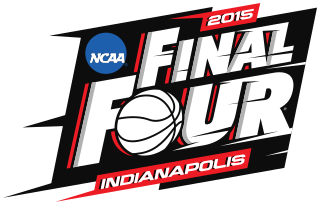
The 2015 NCAA Division I men's basketball tournament involved 68 teams playing in a single-elimination tournament that determined the National Collegiate Athletic Association (NCAA) Division I men's basketball national champion for the 2014-15 season. The 77th edition of the tournament began on March 17, 2015, and concluded with the championship game on April 6, at Lucas Oil Stadium in Indianapolis, Indiana.
